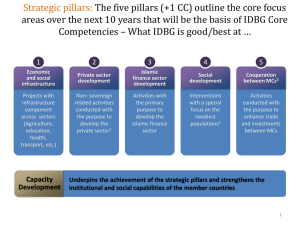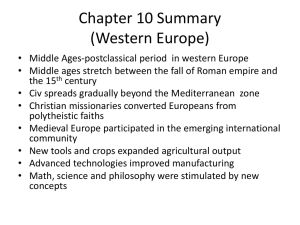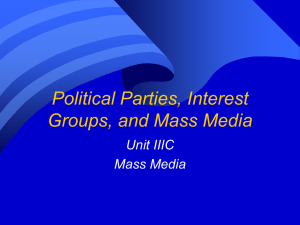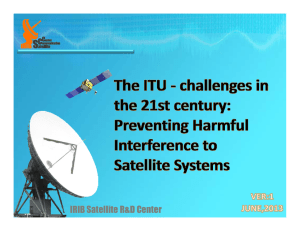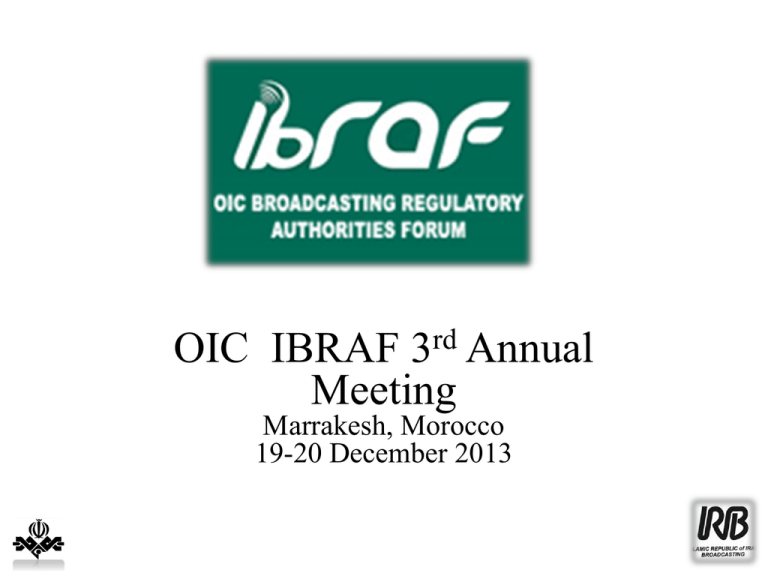
OIC IBRAF 3rd Annual
Meeting
Marrakesh, Morocco
19-20 December 2013
Islamic Republic of Iran Broadcasting
(IRIB)
IRIB, Digitalization and
Necessity of Regional
Cooperation through International
Media Regulation
Presentation by M. Mousa Mirghaffari
IRIB, department of Warehouse and Procurement, General Manager
Distinguished delegates,
Ladies and gentlemen,
On behalf of the nation and government of the Islamic Republic of Iran I am
pleased to extend my appreciations to the participating delegates and particularly
the government of Morocco for organizing this session. I wish to seize this
opportunity and voice the Islamic Republic of Iran’s deep satisfaction over the
realization of a broadcasting institute delineating norms in the Islamic Conference
region and hope that the forum by attaining its fundamental goals contribute to the
materialization of the age-old wish by all member states for the sake of creating
common humane and Islamic norms in radio and television broadcast and make
orderly the unfavorable and unbridled current of the broadcast of radio and
television waves.
Islamic Republic of Iran Broadcasting (IRIB) is
the focal point for broadcasting in Iran. This
focal point has been established on the basis of
the Constitution of the Islamic Republic of Iran
and the 98.2 percent vote cast by the Iranian
nation in favor of the Constitution is the source
of support for IRIB’s popularity and legitimacy.
IRIB has 120 radio and television channels in
different languages including Farsi, Arabic,
English, Spanish and Turkish inside and outside
the country and is considered as one of the
biggest broadcasters in the world.
it is among a few broadcasters that is welcomed by its audience and has
influenced them not through violence, sex and trade. On the other hand, it is
welcomed by its audience due to its morality, religion and the unshakeable
family foundation. This exemplary broadcaster has created bonds amongst
millions of its audiences in the region and the world via its health and family
foundations and has freely disseminated information and in this way it has
sought to spread Islam and sublime human values by broadcasting radio and
television programs and at the same time avoiding the spread of harms and
corruptions that have overshadowed modern societies spreading like a disease
from one house to another without drawing any distinction among its
audiences.
The ever-increasing number of audiences of
television channels such as IFilm, Hispan TV,
al-Alam TV and tens of other radio and
television channels particularly among Islamic
states is a proof for this claim.
IRIB like other major world broadcasters is involved in broadcasting and
dissemination of information through various radio and television channels
benefiting from modern communication methods such as digital, land, satellite,
mobile, wireless, DSL (fiber and copper wire) and Wimax networks as well as
internet services such as IP media, OTT (over the top) and CDN (content delivery
network) inside and outside the country. It benefits from the country’s indigenous
technological capacities and capabilities as well as outstanding global service
providers
IRIB develops its activities as a state broadcaster today by
attaching special attention to three sectors:
1-
Production: IRIB operates at least twenty fully digital radio and television
studios in Tehran and more than seventy similar studios in provinces and applies
the most modern media equipment and is considered as a major broadcaster not
only at the regional level but also at the global level. These capabilities have been
boosted several folds due to the involvement of the country’s private sector. The
production of content based on modern communication methods or Media Asset
Management (MAM) has been realized with the aim of developing the processing
of meta data and this trend is still developing;
2-
Transmission: IRIB makes use of satellite and optic fibers and microwave
networks for signaling from the center to provinces and vice versa as well as
overseas and major steps have been taken for developing digital systems;
3- Propagation: IRIB makes use of Digital Terrestrial Propagation enjoying more
than 100 high-frequency radio and television stations and 17,000 small stations
known as Gap Fillers as well as satellite possibilities for developing cable networks
known as IPTV and OTT with 90% digital systems.
The unlawful actions by certain governments in order to hamper the granting of
permits for broadcast by European-related regulators and banning the providing
services by American companies through the Office of Foreign Assets Control
(OFAC) has caused many difficulties inflicting heavy losses upon the IRIB.
In the meantime, more than 500 Farsi-speaking radio and television channels are
broadcasting their programs in the geography of the Islamic Republic of Iran that
are immoral, violent and oppose religion and peaceful coexistence as well as the
rights of children and state order and they have surprisingly received permits for
broadcast from competent regulators and they have plenty of leeway to broadcast
whatever they want due to the absence of an effective regional regulator.
Nowadays, the masters of media directed by the Zionist lobby have
launched a media onslaught targeting the young Muslim generation by
making use of modern communication tools that prevail throughout the
world including in my country even at the level of kindergartens and
mobile phones and tablets are easily accessible and have the capability
to receive different types of information. In such an atmosphere, the
creation of a sound environment based on Islamic thoughts requires
notifications in congruity with people from all walks of life in the target
society.
I wish to reiterate the need for
countering
inappropriate
the
existing
atmosphere
and
direct this forum towards an
effective and efficient regulator
encompassing
Islamic
states
preparing grounds for broadcast
of radio and television channels
using all modern communication
tools and setting obligations for
all senders of information.





